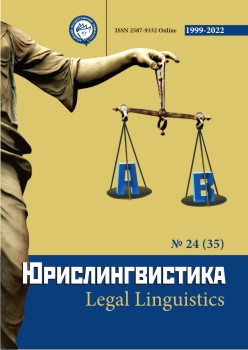"Insulting Religious Feelings": Everyday Consciousness and Law Enforcement
Abstract
The article considers defining the boundaries of the concept of “insulting religious feelings” from the point of view of a specialist in the field of religious studies, ordinary native speakers and a practicing forensic linguist. The material for the study is Internet comments to the news on topics related to religion that came to the attention of law enforcement agencies, analyzed in terms of compliance with the norms of legislation regulating the rights to freedom of conscience and religion, and the norms of administrative and criminal law aimed at protecting the feelings of believers. The paper uses the methods of formal legal analysis, description, experiment, semantic research, sociological survey data. The analysis revealed the causes of emerging social conflicts: low legal and communicative literacy of Internet users, broad interpretation of the concept of insult in the public and individual minds compared to the legal system, and the subjective perception of language units as emotionally evaluative or, on the contrary, neutral.
Downloads
Metrics
References
Алексеенко И.С., Гукосьянц О.Ю. Специфика интернет-опосредованной коммуникации и феномен виртуальной языковой личности / Политическая лингвистика. – 2014. – №50(4). – С. 193–202.
Доронина С.В. Инвективная функция насмешки и проблемы ее экспертной оценки / Юрислингвистика. – 2002. – №3. – С. 78–85.
Евгеньева А.П. (Ed.). Словарь русского языка в четырех томах. Москва, 1999.
Кащаева М.В. Зашита чувств верующих в парадигмах российского уголовного и административного законодательства / Вестник Барнаульского юридического института МВД РФ. – 2019. – № 1(36). – С. 79–81.
Леонтьев А. А. Психология общения. М., 1999.
Стексова Т.И. Комментарий как речевой жанр и его вариативность / Жанры речи. – 2013. – №9(1). – С. 82–88.
Трубникова Ю.В. Экспериментальное исследование деривационных механизмов взаимодействия первичного и вторичного текстов / Сибирский филологический журнал. – 2008. – № 2. – С.118–132.
Чернышкова З.Е. Религиоведческая экспертиза: анализ действий, направленных на оскорбление чувств верующих / Философские науки. – 2017. – №3. – С. 202–205.
Федотова Ю.Е. Оскорбление религиозных чувств верующих и уголовный закон: работа над ошибками / Юридическая наука и правоохранительная практика. – 2016. – №1. – С. 199–205.
Шапарь В.Б. Практическая психология. Психодиагностика отношений между родителями и детьми. Ростов-на-Дону, 2006.
Шилин Д.В. Уголовная и административная ответственность за нарушение права на свободу совести: правовое разграничение / Журнал российского права. – 2016. – №5. – С. 81 – 89.
Шнитенков А.В. Оскорбление религиозных чувств верующих: проблемы законодательной регламентации уголовной ответственности / Современное право. – 2014. – №3. – С. 107–109.
European Union (1950). Convention for the Protection of Human Rights and Fundamental Freedoms. Available from https://www.echr.coe.int/Documents/Convention_RUS.pdf
Copyright (c) 2022 Доронина Светлана, Мирра Кащаева, Юлия Трубникова

This work is licensed under a Creative Commons Attribution 4.0 International License.
The authors, which are published in this journal, agree to the following conditions:
1. Authors retain the copyright to the work and transfer to the journal the right of the first publication along with the work, at the same time licensing it under the terms of the Creative Commons Attribution License, which allows others to distribute this work with the obligatory indication of the authorship of this work and a link to the original publication in this journal .
2. The authors retain the right to enter into separate, additional contractual agreements for the non-exclusive distribution of the version of the work published by this journal (for example, to place it in the university depository or to publish it in a book), with reference to the original publication in this journal.
3. Authors are allowed to post their work on the Internet (for example, in a university repository or on their personal website) before and during the review process of this journal, as this may lead to a productive discussion, as well as more links to this published work (See The Effect of Open Access).











